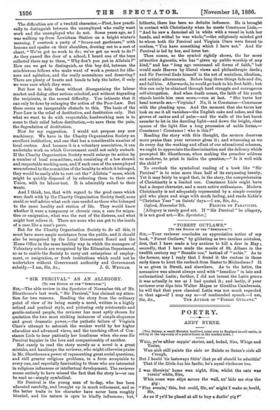"SIR PERCIVAL " AS AN ALLEGORY.
[To THE EDITOR OP ml " SPECTATOR:]
Sur.,—The able review in the Spectator of November 6th of Mr. Shorthouse's last work, "Sir Percival," has claimed my atten- tion for two reasons. Reading the story from the ordinary point of view of its being merely a novel, written in a highly refined and poetical style, and picturing only aristocratic and gentle-natured people, the reviewer has most aptly chosen for quotation the two most striking instances of simple eloquence and great dramatic power,—the pathetic failure of Virginia Clare's attempt to astonish the weaker world by her higher education and advanced views, and the touching effort of Con- stance Lisle to bear patiently her loneliness when she sees Sir Percival happier in the love and companionship of another.
But surely to read the story merely as a novel is a great mistake, and handicaps the reviewer, who might otherwise praise in Mr. Shorthouse a power of representing great social questions, and still greater religions problems, in a form acceptable to every one, and especially fascinating to those who are interested in religious influences or intellectual development. The reviewer seems entirely to have missed the fact that the story is—or can be read as—simply symbolical.
Sir Percival is the young man of to-day, who has been educated carefully, and brought up in much refinement, and so the better traits in his character have never been roughly blunted, and his nature is open to kindly influences; but, hitherto, there has been no definite influence. He is brought in contact with Christianity when he meets Constance Lisle,— " And he saw a damoisel all in white with a vessel in both her hands, and withal he was whole,"—the religiously minded girl to whom both Sir Percival and Virginia Clare were forced to confess, "You have something which I have not." And Sir- Percival is led by her, and loves her.
Then comes, as the symbol rightly shows, the far more attractive Agnostic, who has "given up public worship of any kind," and has "long ago renounced all forms of faith," bat would scale Heaven by liberal views and philanthropic deeds ; and Sir Percival finds himself in the net of socialism, idealism, and artistic allurements. Before long these things fade and die, and fail him. Afterwards, he would go back to his first faith ; but this can only be obtained through hard struggle and courageoua self-abnegation. And when death comes, the faith of his youth stands beside him once more,—won at last. "She turns her head towards me,—Virginia ? No, it is Constance—Constance with the pleading eves. And the moment that she turns her look on me it all vanishes—the English oaks and ashes, and the- groves of cactus and of palm—and the walls of the hut burst asunder to let in the dazzling light—and down the bright, clear spaces of the light files a long procession of noble forms,— Constance ! Constance ! who is this ?"
Reading the story with this thought, the sermon deserves- more praise than your reviewer gives it ; and witnessing as we do every day the working and effect of our educational schemes, we ought to appreciate the discrimination and the delicacy which prompted Mr. Shorthonse, when making the preacher address us moderns, to print in italics the question,—" Is it well with the child ?"
To overlook the symbolical reading of a book like "Sir Percival" is to miss more than half of its surpassing beauty. Yet it may fairly be urged that, in the story, the comprehension of Christianity is a limited one. Constance Lisle might have had a deeper character, and a more active enthusiasm. Modern, Christianity is not adequately represented by a simple country girl who plays and sings with much feeling, and reads Keble's. "Christian Year" on Saints' days.—I am, Sir, &c.,
Oxford, November 91h. FRANCES DE PARAVICINI. [Allegory is rarely good art. If "Sir Percival" be allegory, it is not good art.—ED. Spectator.]


































 Previous page
Previous page